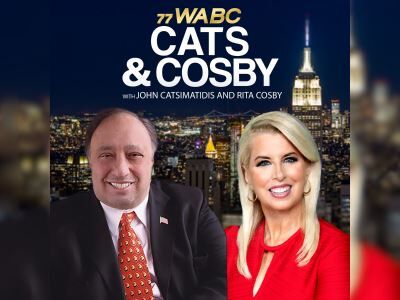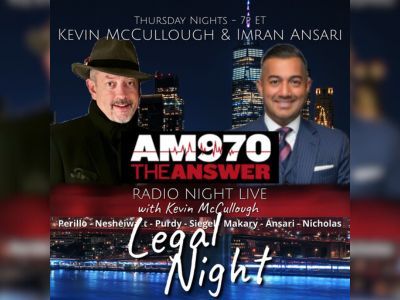Kimmel's future hangs in balance after ABC suspends his late-night show over Charlie Kirk comments
News > Politics & Government News

Audio By Carbonatix
11:14 AM on Thursday, September 18
By DAVID BAUDER
NEW YORK (AP) — Jimmy Kimmel’s television future hung in the balance Thursday after ABC suspended his late-night show following the host’s comments about the assassination of Charlie Kirk, leaving the network's parent company to decide whether supporting him is worth the risk to its business.
Two other companies that operate dozens of ABC stations came out against Kimmel, and they are being cheered on by a Trump administration regulator who can make life difficult for ABC's owner, the Walt Disney Co.
But advocates for free speech say it's time for the company to take a stand.
Kimmel made several remarks on his show Monday and Tuesday about the reaction to the conservative activist's killing last week, suggesting many Trump supporters are trying to capitalize on Kirk's death. “The MAGA gang (is) desperately trying to characterize this kid who murdered Charlie Kirk as anything other than one of them and doing everything they can to score political points from it,” Kimmel said.
The chairman of the Federal Communications Commission, Brendan Carr, said Kimmel appeared to be making an intentional effort to mislead the public that the man accused in the fatal shooting was a right-wing Trump supporter. Authorities say 22-year-old Tyler Robinson grew up in a conservative household in southern Utah but was enmeshed in “leftist ideology.”
Kimmel has not commented on the suspension. His supporters say Carr misread what the comic said and that nowhere did he specifically suggest that Robinson was conservative.
President Donald Trump said Kimmel had bad ratings and should have been fired long ago. “So, you know, you could call that a free speech or not. He was fired for lack of talent,” Trump said Thursday at a news conference in Britain. Later while returning to the U.S. aboard Air Force One, he said federal regulators should consider revoking broadcast licenses for networks that “give me only bad publicity.”
ABC, which has aired “Jimmy Kimmel Live!” since 2003, announced the suspension Wednesday shortly after Nexstar Communications Group said its stations would not show Kimmel because his Kirk remarks were “offensive and insensitive.” Nexstar operates 28 ABC affiliates.
Sinclair Broadcast Group said it would not air the show either. The company called on Kimmel to apologize to Kirk's family and make a “meaningful personal donation” to the activist's political organization, Turning Point USA. Sinclair says that its 38 ABC stations will air a tribute to Kirk on Friday in Kimmel's time slot.
Local affiliates in the past occasionally grumbled about some shows from the network and even refused to air them. What's new is that so many stations are working together to apply the pressure at the same time, said Robert Thompson, founding director of the Bleier Center for Television and Popular Culture at Syracuse University.
In some ways, Kimmel's situation hearkens back to a famous event in television history. CBS abruptly canceled a popular variety show, “The Smothers Brothers Comedy Hour,” in 1969 when the network got heat for the hosts' stance against the Vietnam War.
The refusal by 66 stations to air a program represents a significant financial hit. Roughly 230 stations across the country carry ABC programming. The network owns and operates eight of the largest stations, in cities such as New York, Los Angeles, Chicago and Houston.
In an appearance on CNBC Thursday, Carr cheered the moves by Nexstar and Sinclair. While the FCC does not have formal power over the national networks, it does have the authority to suspend the licenses of individual stations in local markets.
“We’re reinvigorating the FCC’s enforcement of the public interest,” Carr said, “and I think that’s a good thing.”
Both Disney and Nexstar have FCC business ahead of them. Disney is seeking regulatory approval for ESPN’s acquisition of the NFL Network, and Nexstar needs the Trump administration’s blessing to complete its $6.2 billion purchase of broadcast rival Tegna.
For both companies, reinstating Kimmel after a suspension would risk angering Trump, who has already inaccurately claimed that the show has been canceled.
Disney arguably started a cascade of media companies choosing not to fight when threatened by the president. The company agreed in December to pay $15 million toward Trump's presidential library to settle his lawsuit against ABC News. Then CBS News parent Paramount paid $16 million to make Trump's lawsuit against “60 Minutes” go away.
Shortly after the “60 Minutes” settlement, the FCC approved Paramount's merger with Skydance Media. Also in July, CBS announced that late-night comic Stephen Colbert's show would be canceled at the end of next season for financial reasons, an explanation that raised suspicions that politics played a part. Colbert and Kimmel are the two harshest Trump critics on late-night broadcast television.
The Kimmel suspension was met with anger and disappointment in some political circles and the creative community.
“After years of complaining about cancel culture, the current administration has taken it to a new and dangerous level by routinely threatening regulatory action against media companies unless they muzzle or fire reporters and commentators it doesn't like,” former President Barack Obama said Thursday on X.
U.S. Sen. Elizabeth Warren, a Massachusetts Democrat, said: “First Colbert, now Kimmel ... it sure looks like giant media companies are enabling his authoritarianism.”
Kimmel would appear to have “a very narrow path” back to the air on ABC, said Bill Carter, author of “The Late Shift” and an authority on late-night TV. Disney is doubtless getting pressure from stakeholders to avoid a fight.
But Disney CEO Bob Iger has no doubt learned that giving in to a bully doesn't make him go away, Carter said. Iger may see that capitulation in the form of permanently taking Kimmel off the air would be a stain on his reputation, he said.
“It's easy for me to say it's time to stand up,” Carter said. "But if not now, when?
In an interview with Variety this past summer, Kimmel was asked if he was worried that the administration would come after comedians, as it has journalists.
“Well, you’d have to be naive not to worry a little bit,” he said. “But that can’t change what you’re doing.”
If comedians were targeted, Kimmel said, he hoped that “even my colleagues on the right will support my right to say what I like.”
___
Associated Press Writer Barbara Whitaker in New York contributed to this report.
___
David Bauder writes about the intersection of media and entertainment for the AP. Follow him at http://x.com/dbauder and https://bsky.app/profile/dbauder.bsky.social.












